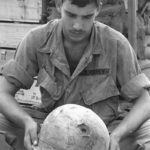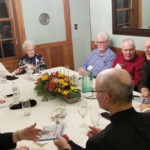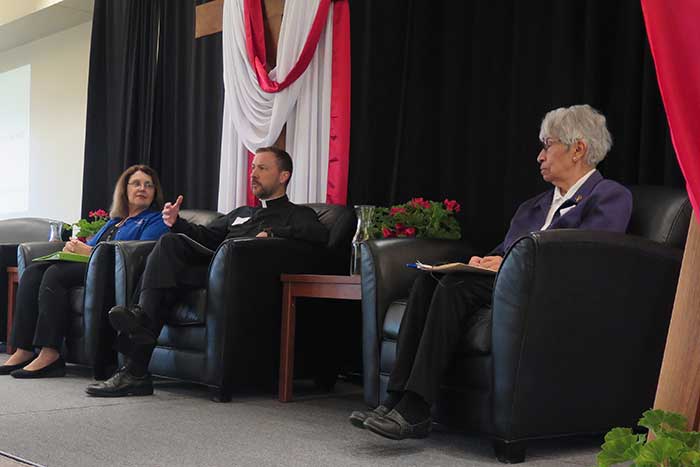
From left, Marianne Agnoli, Father Thom Hennen and Sister Irene Munoz, CHM, speak on mission during the Synodal Summit June 17 at St. Ambrose University in Davenport.
(Editor’s note: This is the third story in a three-part series on the diocesan Synodal Summit, held June 17 at St. Ambrose University in Davenport.)
By Barb Arland-Fye
The Catholic Messenger
Two years ago, Pope Francis asked Catholics worldwide to engage in listening sessions focusing on three dimensions of a Synodal Church — communion, participation and mission — to share with the Synod of Bishops that will convene in October. “These three dimensions are profoundly interrelated. They are vital pillars of a Synodal Church,” Pope Francis said.
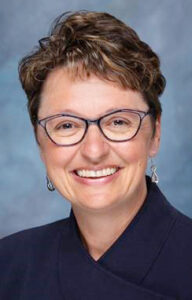
“Mission,” the third dimension, “is intended to enable the Church to better witness to the Gospel, especially with those who live on the spiritual, social, economic, political, geographical, and existential peripheries of the world,” Pope Francis said. “In this way, synodality is a path by which the Church can more fruitfully fulfil her mission of evangelization in the world, as a leaven at the service of the coming of God’s kingdom.”
Young adults find community in “good church” and a space for reflection in an often chaotic world, St. Ambrose University President Amy Novak said in a video message during the Synodal Summit’s third panel, focused on mission. She spoke of the profound experience of listening to young people in synodal listening sessions. Some expressed hurt, “particularly around parents who’ve divorced and now are not going to church at all, around a family member or friend who’s part of the LGBTQ community and didn’t feel welcomed.” There’s concern about polarization, about bishops arguing with bishops or priests delivering conflicting messages.
Watching student groups develop organically over the past year, she has learned that “it’s not about what I think they need, it’s about what they create and how we give space to them to be co-creative with us in building the body of Christ.” Students want to be “out in community, really living into the joy of what it means to be Church. They’re invested in inclusion and prayer and just being alongside one another, and mercy.”
Sister Irene Munoz, CHM, spoke on cultivating unity in multicultural settings and the need to enlarge the tent (a symbol of the Synod) religiously and culturally. She retired last year as multicultural minister for the Ottumwa area. “… As a Hispanic woman, religious and activist, I have been blessed to have had the opportunity to minister to, to walk with, to struggle with and to celebrate with immigrants,” she said. She named the various languages now spoken in Ottumwa by immigrants from South America, Central America, Micronesia, the Philippines and countries in Africa.
Sister Munoz advised the gathering to be unafraid to welcome the newcomers and to listen to their stories. They arrive in the U.S. to escape violence, poverty and upheaval in their homelands. Ask “for the Holy Spirit to help us, to endear us, to have those gifts of the Spirit of compassion, of listening,” she said. Learn some simple words of welcome in that person’s native language. “Sometimes our body language speaks louder than words,” she cautioned.
Father Thom Hennen, diocesan vicar general and pastor of Sacred Heart Cathedral in Davenport, spoke about COURAGE, an apostolate helping same-sex attracted Catholic men and women to lead chaste lives. Through this work, he also became involved in ministry to family members and other loved ones of people who are part of the LGBTQ+ community. Now, he is part of a diocesan committee exploring “how we can better encounter them, accompany them on that journey.” He shared lessons he’s learned in this ministry. “Remember, people are people.”
He met LGBTQ+ people “who are and want to be Catholic and who love the Church and who love their Catholic faith.” These are people faithfully living their Catholic faith despite their possibly negative experiences within the Church. They are “wrestling with who they are in relationship to the Church they love,” he said.
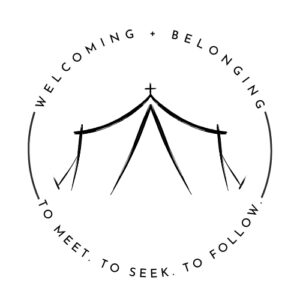 “It is important to listen for understanding and not to judge,” Father Hennen said. “We should not feel forced into choosing between truth and love. The truth is ultimately loving. The way that the truth is expressed is not always loving and that’s what we have to navigate very carefully.”
“It is important to listen for understanding and not to judge,” Father Hennen said. “We should not feel forced into choosing between truth and love. The truth is ultimately loving. The way that the truth is expressed is not always loving and that’s what we have to navigate very carefully.”
Marianne Agnoli, diocesan marriage and family life coordinator, spoke about ministry to divorced persons, remarried couples and to couples in ecumenical or interfaith marriages. She advised ministers and pastoral leaders to get educated on these topics and to educate their communities. “There is so much misinformation about what the Church teaches and what the Church allows or doesn’t allow,” she said. Think of various ways to convey the accurate information, she added.
She encouraged development of divorce support groups and promotion of the diocesan Tribunal’s presentations on the annulment process. She recommended being intentional about programs and activities that nurture welcoming and belonging. Personally invite a spouse who is not Catholic to serve in a role in the parish, she suggested.










